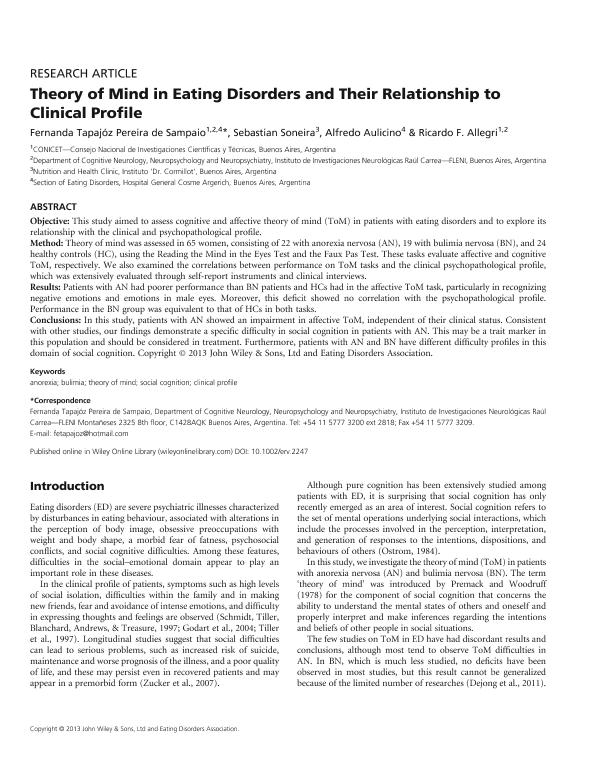Artículo
Theory of mind in eating disorders and their relationship to clinical profile
Tapajoz Pereira de Sampaio, Fernanda ; Soneira, Sebastian; Aulicino, Alfredo; Allegri, Ricardo Francisco
; Soneira, Sebastian; Aulicino, Alfredo; Allegri, Ricardo Francisco
 ; Soneira, Sebastian; Aulicino, Alfredo; Allegri, Ricardo Francisco
; Soneira, Sebastian; Aulicino, Alfredo; Allegri, Ricardo Francisco
Fecha de publicación:
11/2013
Editorial:
Wiley
Revista:
European Eating Disorders Review
ISSN:
1072-4133
e-ISSN:
1099-0968
Idioma:
Inglés
Tipo de recurso:
Artículo publicado
Clasificación temática:
Resumen
Objective This study aimed to assess cognitive and affective theory of mind (ToM) in patients with eating disorders and to explore its relationship with the clinical and psychopathological profile. Method Theory of mind was assessed in 65 women, consisting of 22 with anorexia nervosa (AN), 19 with bulimia nervosa (BN), and 24 healthy controls (HC), using the Reading the Mind in the Eyes Test and the Faux Pas Test. These tasks evaluate affective and cognitive ToM, respectively. We also examined the correlations between performance on ToM tasks and the clinical psychopathological profile, which was extensively evaluated through self-report instruments and clinical interviews. Results Patients with AN had poorer performance than BN patients and HCs had in the affective ToM task, particularly in recognizing negative emotions and emotions in male eyes. Moreover, this deficit showed no correlation with the psychopathological profile. Performance in the BN group was equivalent to that of HCs in both tasks. Conclusions In this study, patients with AN showed an impairment in affective ToM, independent of their clinical status. Consistent with other studies, our findings demonstrate a specific difficulty in social cognition in patients with AN. This may be a trait marker in this population and should be considered in treatment. Furthermore, patients with AN and BN have different difficulty profiles in this domain of social cognition.
Palabras clave:
ANOREXIA
,
BULIMIA
,
CLINICAL PROFILE
,
SOCIAL COGNITION
,
THEORY OF MIND
Archivos asociados
Licencia
Identificadores
Colecciones
Articulos(SEDE CENTRAL)
Articulos de SEDE CENTRAL
Articulos de SEDE CENTRAL
Citación
Tapajoz Pereira de Sampaio, Fernanda; Soneira, Sebastian; Aulicino, Alfredo; Allegri, Ricardo Francisco; Theory of mind in eating disorders and their relationship to clinical profile; Wiley; European Eating Disorders Review; 21; 6; 11-2013; 479-487
Compartir
Altmétricas



